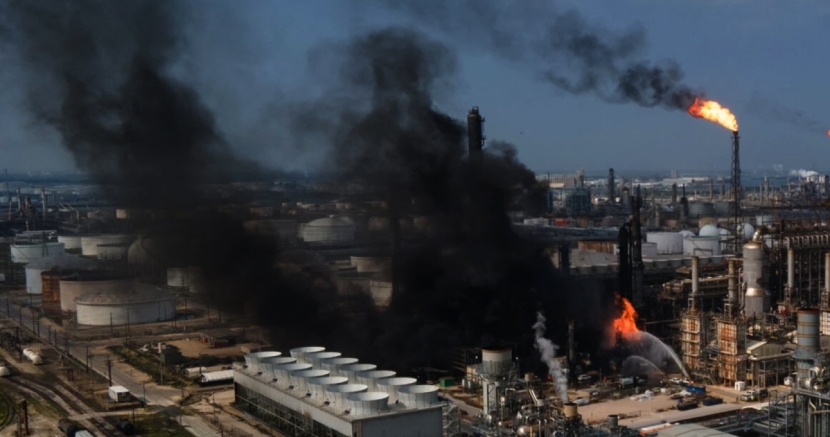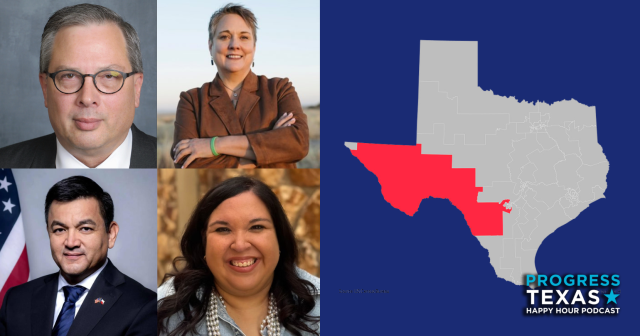Good step: Pausing LNG export approvals, Next step: Combat Climate Crisis in Texas

Dear Representatives Allred, Casar, Castro, Crockett, Cuellar, Doggett, Escobar, Fletcher, Garcia, Gonzalez, Green, Jackson Lee, and Veasey,
As climate voters, we write today to oppose H.R. 1130, the Unlocking our Domestic LNG Potential Act of 2023, and any related measures that would accelerate the expansion of liquefied methane gas (LNG) exports.
Texas is a top oil and gas exporter, but we Texans have an interest in ensuring that our families are safe from the high and long-term costs of liquefied natural gas on our health and local economies, and of course, not adding more fuel to the fire of our already scorching climate.
At the same time, we commend the Biden Administration’s January 26, 2024, decision to pause all pending and future authorizations of new LNG export projects until the Department of Energy (DOE) updates its approach to reviewing these projects.
H.R. 1130 would strip away the federal government’s ability and responsibility to examine the full impacts of LNG expansion on the economy, consumer energy costs, the climate, and frontline communities. LNG exports negatively impact Americans by exacerbating climate change, perpetuating environmental injustices, and raising energy prices for households, small businesses, and manufacturers. These impacts must be taken into account when the DOE decides whether to approve future LNG export projects. H.R. 1130, however, would remove the DOE’s legal obligation to assess such factors and their impact on everyday Americans and the U.S. economy.
Rather than passing vital legislation to fund the government to avoid a catastrophic shutdown, the House Majority is instead using valuable floor time to consider giveaways to the fossil fuel industry. We want you to stand with us, not them. Thanks to the unprecedented growth in LNG exports in recent years, the fossil fuel industry is already raking in record profits at the expense of consumers and future generations. Now their allies in Congress are putting forward legislation to lock us into ever-increasing gas extraction, higher and more volatile energy prices, and devastating environmental, health, safety, and climate impacts – particularly for frontline communities.
The Biden Administration, on the other hand, is taking swift action to ensure that LNG exports are only approved if the DOE determines they are in the public interest. The pause on pending and future LNG export applications, as well as the reevaluation of the criteria used to consider proposed export projects, will allow the DOE to update its outdated and deficient approach to reviewing LNG export applications. The DOE undertook a similar process for determining whether LNG imports were in the public interest in 1984, and now, four decades later, the Department is initiating a long-overdue process of clarifying how it considers the impacts of exports.
H.R. 1130 would take us in the exact opposite direction, revoking DOE’s ability to ensure that new LNG exports do not raise costs to U.S. consumers, accelerate the climate crisis, or jeopardize the health and safety of communities living alongside fossil fuel infrastructure. The legislation is a dangerous handout to the oil and gas industry that would expedite the approval of LNG exports by removing the first three sections of the Natural Gas Act, which require a public interest determination for LNG exports to countries with whom the United States does not have an existing free trade agreement. Instead of requiring a rigorous review process consistent with good governance practices, H.R. 1130 directs the Federal Energy Regulatory Commission (FERC) to deem gas exports in the public interest without requiring any consideration of impacts on the American public.
Among other considerations, it is critical that LNG export decisions take lifecycle greenhouse gas emissions into account. There are eight existing LNG export facilities and over 20 proposed additional projects, the full buildout of which would be equivalent to the annual climate pollution from 681 coal plants or 548 million cars. Expanding domestic fossil fuel production to supply LNG exports directly impedes the U.S.’s ability to meet its own greenhouse gas and methane targets, jeopardizes the commitments of countries where the gas is exported, and undermines our ability to lead by example in global efforts to wind down fossil fuel production and avert catastrophic climate impacts. The proposed legislation would undermine the federal government’s ability to even consider such impacts when deciding whether an LNG export project should be approved.
The expansion of LNG exports is also a glaring environmental injustice. Sited primarily in low-income communities and communities of color along the Gulf Coast, existing and proposed LNG export facilities harm communities that are already overburdened by industrial pollution from the fossil fuel industry, as well as the effects of extreme weather driven by climate change. It is critical that the federal government retains the authority to make public interest determinations for LNG exports in line with its environmental justice policies.
Finally, consumers across the U.S. are suffering from rising energy costs exacerbated by LNG exports. Skyrocketing energy costs can be traced to increases in LNG exports, as can increases in prices of consumer goods. These cost increases disproportionately burden people of color and low-income or otherwise disadvantaged communities and households. It is imperative that federal agencies retain the authority to consider domestic consumer impacts when determining whether additional exports are in the public interest.
We write to express our deep concern with any efforts to weaken laws and regulations that protect Americans from the negative impacts of LNG exports. We hope that you will join us in opposing this piece of harmful legislation.
This pause is a clear win for the public, and members of Congress who prioritize their constituents instead of Big Oil profits are leading the way to fight back. President Biden is answering the call to action across the country, and a pause will help combat the climate crisis in Texas—one of the most threatened states in America.
Sincerely,
Ben Jackson, Alpha Phi Alpha Fraternity Inc., Our Vote Our Voice, Education Chair
Ayanna Jolivet Mccloud, Bayou City Waterkeeper
Robert D. Bullard, Ph.D., Bullard Center for Environmental & Climate Justice
Chispa Texas
Virginia Palacios, Commission Shift, Executive Director
Lakiesha Lloyd, Common Defense
Luke Metzger, Environment Texas
Donna Thomas, Fort Bend County Environmental Organization, CEO
Stephone Coward, Hip Hop Caucus, Economic Justice Director
Ranjana Bhandari, Liveable Arlington, Executive Director
John Beard, Port Arthur Community Action Network
Kathleen Thompson, Progress Texas
Property Rights and Pipeline Center
Adrian Shelley, Public Citizen, Texas Director
Dave Cortez, Sierra Club Lone Star Chapter
Bekah Hinojosa, South Texas Environmental Justice Network - Brownsville, TX
Juan Parras, TEJAS: Texas Environmental Justice Advocacy Services
Robin Schneider, Texas Campaign for the Environment
Daniel Ayala, Vice-President of the Texas Enviornmental Democrats Caucus
Bee Moorhead, Texas Impact
Becca Edwards, Texas Interfaith Power and Light
Gene Collins, Texas NAACP Environmental Justice Chair
M. Emad Salem, Texas Progressive Caucus
Texas Progressive Caucus
Turtle Island Restoration Network, Gulf of Mexico
Mohammad “Jazz” Aijaz, SDEC Committeeman, Senate District 17
Jennifer Cantu, SDEC Committeewoman, Senate District 18
Nathan Clark, SDEC Committeeman, Senate District 2
Kolby Duhon, SDEC Committee Member/Chair of Messaging, Senate District 14
Nicholas Hudson, Ed.D., SDEC Committeeman, Senate District 21
Wesley Lawrence, SDEC Committeeman, Senate District 29
Jen Ramos, SDEC Committeewoman, Senate District 21
Kendall Scudder, Vice Chair for Finance of the Texas Democratic Party
Cristan Shamburger, SDEC Committeewoman, Senate District 2
Myra Mills Tschirhart, SDEC Committeewoman, Senate District 10
Ashley Cheng, Democratic National Committee Member
Andre Treiber, Democratic National Committee Member
Robert WIlliams, Community Advocate
*as of 2/7/2024
DONATE
Your donation supports our media and helps us keep it free of ads and paywalls.








